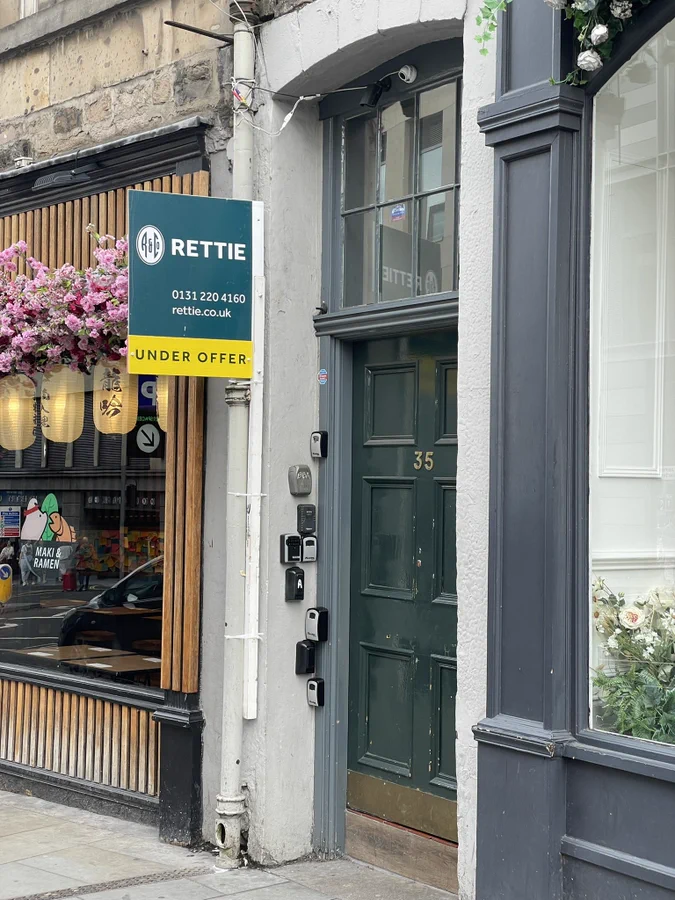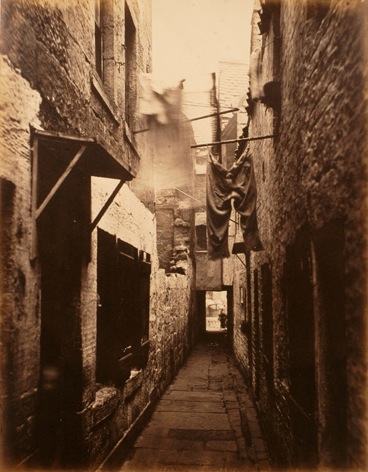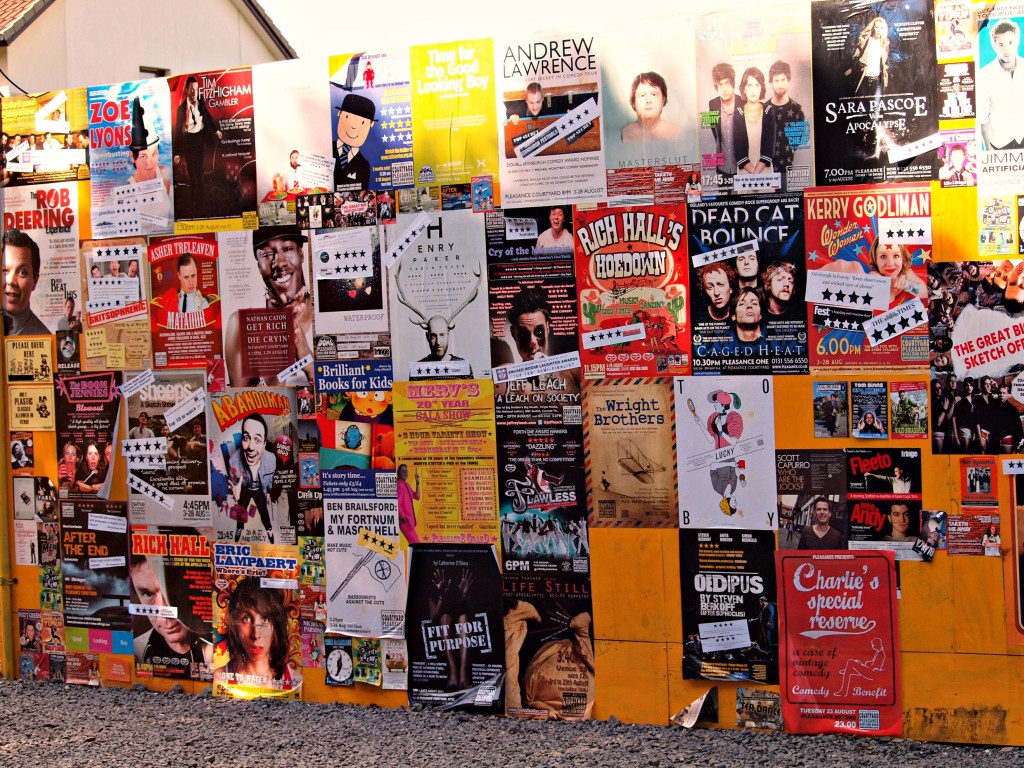Who Are Our Cities For?

In which Simon Constable and Fiona Campbell come to the rescue of Edinburgh’s housing crisis, and save the Edinburgh Festival …
Too late for my 2023 Wrapped, Spotify’s algorithm recently suggested that I might want to listen to the Constable Confidential podcast, episode title “Housing Crisis in Scotland and How the Edinburgh Festival Will Never Be the Same Again”.
Currently living in France, Simon Constable is a journalist and author with an extensive broadcasting background. He writes for the Wall Street Journal, Time, Forbes.com, among others and was presenter of the Wall Street Journal’s flagship daily TV show. Since early October he has hosted his own podcast. Of the 13 episodes to date, the subject matter has been the Middle East crisis – mainly, but not exclusively the Israel-Hamas war – but, bizarrely, two episodes have been interviews with Fiona Campbell, CEO of the Association of Scotland’s Self-Caterers (ASSC). It was the second of these that Spotify thought might be of interest to me. The episode was recorded – and listened to by me – prior to the recent Court of Session ruling on the City of Edinburgh Council’s interpretation of law in implementing the city-wide short term let control area.

Constable has chosen to illustrate the episode with a photograph of – and this is how it is described in the credits – “Slum in Glasgow, 1871″ (above). An image of a slum from 150 years ago doesn’t seem an appropriate way to represent a serious conversation about housing in Scotland today. I can’t be the only person to find that a bit insulting. The image is instantly recognisable, and the photographer at least is correctly acknowledged. Thomas Annan, who founded his own photographic printing works in Hamilton in 1859, was commissioned by the City of Glasgow to photograph the slums of the old town prior their demolition and the building of new housing. An original photographic print is currently on display at the Scottish National Portrait Gallery in Edinburgh as part of the fascinating Making Space | Photographs of Architecture exhibition, which illustrates the role of architecture in the history of photography.
Having read some of Constable’s recent articles in the Wall Street Journal and listened to a couple of his Middle East podcasts – solid journalism both – it’s hard to know what to make of this. It’s like the audio from a piece of experimental theatre with the two actors barely able to stifle their laughter. “We go now to Loch Lomond, the beautiful Loch Lomond near Glasgow, where Fiona Campbell the CEO of the Association of Self Caterers is waiting for us, you are delightful.”
Immediately prior to that, over the prelude to act 3 of Wagner’s Die Walküre, Constable kicks off the podcast by announcing “The Scottish Government pledges almost $1 million to Gaza. Meanwhile Scotland suffers a housing crisis. It’s the latest in a monumental mess.” A few minutes later he suggests that “the housing crisis could probably be fixed with a fair amount of that $1 million”, an odd assessment for someone so well versed in economics. He makes further comments belittling the country where he was awarded the first of several university degrees in 1991, and more recently an MBA from Edinburgh Napier University. The Scottish Government’s decision to make three donations totalling £1 million to Gaza was a gesture of decency and humanity; to be fair, Fiona Campbell doesn’t rise to Constable’s bait on this subject.

Campbell has never hidden her disdain for the Scottish Greens, who she describes here as the green tail (to the SNP dog). She then goes on to say that “the good news is that tail docking is still legal in Scotland” to which both she and Constable chortle. It’s not the first time she has used this analogy, which some might find offensive. She rolled it out in October when Greens co-leaders Patrick Harvie gave a conference speech in which he referenced “oppressed landlords of Morningside”. In context, this is what he said:
“The people who most want the [Bute House] Agreement to fail are the same people who rant about an imaginary ‘war on motorists’, who fear 20-minute neighbourhoods as a sinister conspiracy, who regard loft insulation as the front line of communism, whose hearts bleed for the oppressed landlords of Morningside, every chance they get to sow division they will seize it.”
By no stretch of the imagination a direct attack on the short term let sector but nevertheless Campbell (on behalf of the ASSC) accused him of “entitled policy making which fails to take account of the people he purports to serve [and] it is high time the green tail, that continues to wag the dog, is docked.”
But it’s the second part of the podcast – “How the Edinburgh Festival Will Never Be the Same Again” – that really drew my interest. This has been a mantra of the short-term letting sector while the debate over the legislation has rumbled on throughout the past year, as if they control the annual arts event.
When established performers are baulking at paying £9,000 for a month’s rent in Edinburgh in August, it’s not the survival of the Festival we should be worrying about but people who are no longer able to afford to live in the city year round, when visitors have displaced them in residential properties. We’re told during the podcast that there are only 1,811 self-catering properties on non-domestic rates in Edinburgh. I have no reason to dispute that but, as of today, there are 5,508 entire home / apartments available in Edinburgh listed on Airbnb.
In both episodes Campbell claims that “a lot of people who are stopping self catering are leaving [their properties] lying empty”. It may be the case that some people are doing that, but if you are running a business and because of a change in legislation you are forced to cease trading, why would you let your one tangible asset lie to waste? It makes no commercial sense, especially if the property is mortgaged. Surely you would either rent it out on a long-term tenancy or sell it. (If you can afford to leave a property empty, you wouldn’t let it out as a holiday let in the first place.) My guess is that not many of those extra 4,000 properties on Airbnb are going to be left empty.

In one of several surreal moments Constable suggests that, from his experience of living in Edinburgh, “if there was an extra tax on a second home, people would be more inclined to buy one because they want to be seen to be extra posh.”
Ramping up the panic, he continues, “Is the Festival going to cease to exist? Once you lose the momentum in something, you can sometimes not get it back? Is it going to be the death knell of the Festival.” After a brief pause, Campbell sombrely responds “You’ve got to remember that the basis of the Festival started out with people renting out their own rooms in their own houses.” What she fails to add is that they still can! A 6 week temporary short term let exemption is available for this very purpose from the City of Edinburgh Council.
“The Festival is in peril,” Campbell concludes. Well, I doubt that very much, Edinburgh’s festivals have constantly evolved since 1947 and a scaling back might be no bad thing. In any case – much as I love Edinburgh in August – it’s really not that important.
The short term let debate has once again brought sharply into focus a far more pressing question: who are our cities actually for?

“…a far more pressing question: who are our cities actually for?”
Short answer is the people who live in it. Longer answer is more convoluted and complicated. It is good to have tourists to international cities (disclaimer – I have been a tourist in large international cities and enjoyed being there and meeting the inhabitants): both residents and tourists benefit. But I think balance has been lost in Edinburgh, particularly in the City Chambers where, as they look through a telescope at the beautiful city they represent, see only £ and $ signs (as well as Euros, Yen and Yuans).
Be kind of good if you answered the question. Not sure how useful spending a whole article attacking and dismissing another couple of z-list journos take on stuff is.
Thank you for reading the article and taking the time to comment. For clarity, only one of the podcast’s participants is a journalist and although his performance here is seasonally pantomime-esque, I wouldn’t describe Simon Constable as z-list. I rarely agree with anything Fiona Campbell has to say, but as CEO of the ASSC she does a great job on behalf of the self catering sector.
The short term let legislation, though welcome, is a mess – one point on which I do agree with Fiona Campbell. The Court of Session ruling on Friday in favour of two members of the ASSC challenging the retrospectivity of Edinburgh’s STL control area was of no surprise. I understand that a further court case is imminent challenging the council’s interpretation of planning law in relation to short term lets.
Sadly for Edinburgh, the question Who Are Our Cities For? may have come 10-15 years too late.
Thanks for the reply Mark. Was feeling a bit grumpy as so much of what one reads is negative these days. I don’t know of the people you talk about which is my ignorance but I do notice a tendency for a kind of bubble of comment about what other journalists say about things and it gets a bit incestuous sometimes.
I agree that what is happening in Edinburgh (and far from just there of course) is now well set on course and action should have been taken years ago. I notice in Berlin they did but sadly, that is also now unravelling fast. What I do not get about Edinburgh is how the council (and Scottish government in the end) took so long to think about local people or at the very least, not about big business / business in general. The so-called progressive left has got totally sidetracked with other issues and seemingly is now stuck there for good. The old idea of genuine justice based on an overarching idea of social cohesion and basic need is gone as it has become totally fragmented in a free-for-all of rights demands and of course that also includes people like the ASSC and others since everyone can claim discrimination and rights in such a landscape.
“Who are our cities for?”
From the point of view of our landlords, tax-avoiding corporations, grifting politicians and other extractive, parasite “entrepreneurs”, cities exist (like everything else) to be exploited as a source of unearned income until they are bled dry of the amenity that once made them attractive places to live and be.